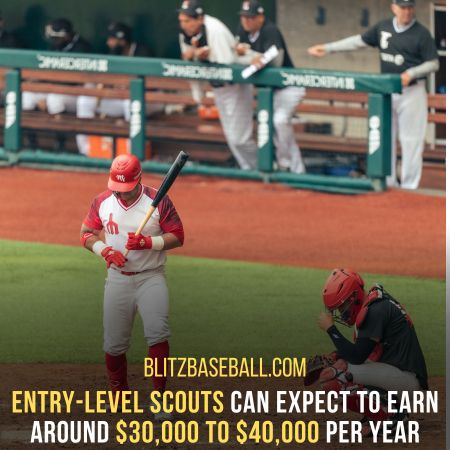Baseball scouts play a crucial role in identifying and evaluating talented players for professional teams. They travel to various leagues and tournaments to observe players, assess their abilities, and determine their potential.
The responsibilities of a baseball scout include evaluating hitting ability, throwing accuracy, running speed, and conducting interviews with coaches and teammates for additional insights. So, how much do baseball scouts make annually?
The salary range for baseball scouts varies based on experience, location, and other factors. Entry-level positions typically pay around $30,000 to $40,000 per year, while advanced-level scouts may earn upwards of $100,000 annually.
Key Takeaways
- Baseball scouts are responsible for finding promising players and assessing their abilities and potential.
- Entry-level scouts can expect to earn around $30,000 to $40,000 per year, while advanced-level scouts may earn upwards of $100,000 or more annually.
- Factors that affect a baseball scout’s salary include their level of experience, competence in talent evaluation, and reputation in finding promising young players.
- In addition to their salary, baseball scouts may receive bonuses based on successful player signings, as well as additional benefits such as health insurance and retirement packages.
How Much Do Baseball Scouts Make
Baseball scouts’ salaries vary based on their experience, location, and other factors. Entry-level positions typically pay around $30,000 to $40,000 per year, while advanced-level scouts may earn upwards of $100,000 or more annually.
Factors affecting a baseball scout’s salary include their level of experience and competence in talent evaluation. Veterans in the scouting profession often command larger wages due to their expertise. Performance in identifying promising players also influences salary, with knowledgeable and experienced scouts earning higher wages.
A scout’s reputation and track record in finding promising young players can impact their earning potential. In terms of bonuses and benefits, scouts often receive bonuses based on successful player signings. They may also receive additional benefits such as health insurance and retirement packages.
Overall, a scout’s salary is influenced by a combination of experience, expertise, performance, and reputation within the industry.

Additional Compensation and Benefits
Bonuses based on successful player signings are common and provide additional compensation for baseball scouts. In addition to these bonuses, scouts may also receive other forms of compensation and benefits.
A work-life balance is important for scouts, as they often have to travel extensively and spend long hours evaluating players. Many organizations provide travel allowances and expense reimbursements to help offset these costs.
Health insurance and retirement benefits are also common perks offered to scouts. These benefits provide job security and ensure that scouts are taken care of both during their active scouting years and after retirement.
While the salary range for baseball scouts may vary, the additional compensation and benefits offered by organizations help to make the job more attractive and rewarding.
| Additional Compensation and Benefits |
|---|
| – Bonuses based on successful player signings |
| – Travel allowances and expense reimbursements |
| – Health insurance and retirement benefits |
Overall, baseball scouting offers not only a competitive salary but also additional compensation and benefits that contribute to a well-rounded work-life balance and job security.

Requirements and Job Outlook
Requirements for becoming a successful scout include knowledge of the game, experience in playing or coaching, and a strong network within the industry. In order to excel in this field, it is important for aspiring scouts to gain experience by volunteering or interning with baseball teams.
Building connections and networking within the industry are also crucial for finding job opportunities and advancing in the field. While there are no specific educational requirements, continuously staying updated on the latest trends in baseball and developing strong communication and interpersonal skills are essential for success.
It’s important to note that the job market for baseball scouts can be highly competitive with limited job prospects, but with dedication, passion, and a strong reputation, scouts can enhance their job prospects and potentially advance within teams or organizations.
Networking and Building Connections
Networking and building connections within the industry are crucial for aspiring scouts to enhance their job prospects and advance in their careers. Building relationships and industry connections can provide valuable insights, opportunities, and recommendations that can help aspiring scouts stand out in a competitive field. Here are four key reasons why networking is important for baseball scouts:
-
Access to information: By building relationships with coaches, players, and other industry professionals, scouts can gain access to insider information about potential prospects, upcoming tournaments, and emerging trends in the game.
-
Collaboration and mentorship: Networking allows scouts to collaborate with experienced professionals, learn from their expertise, and gain valuable mentorship, which can help improve their skills and knowledge in talent evaluation.
-
Job opportunities: Industry connections can lead to job opportunities, both within teams and organizations, as well as through recommendations to other scouts or talent evaluators.
-
Industry visibility: Networking helps scouts establish their presence and reputation within the industry, making it more likely for teams and organizations to consider them for future scouting positions.
Tips for Success
To succeed as a baseball scout, it is important to continuously educate oneself on the latest trends in the game and stay updated on player evaluation techniques. Here are some tips for success in the field:
-
Develop a keen eye for talent: Pay attention to the details and nuances of a player’s performance, such as their hitting ability, throwing accuracy, and running speed.
-
Build a strong network: Connect with coaches, scouts, and other professionals in the baseball community. Networking can open doors to new opportunities and provide valuable insights.
-
Attend games and tournaments: In-person observations allow for a more comprehensive evaluation of players. Watch as many games as possible to expand your knowledge and understanding of different playing styles.
-
Embrace technology: Utilize advanced scouting tools and software to enhance your evaluation process. Stay abreast of new technologies and analytics that can provide valuable data for player assessments.
-
Continuously educate yourself: Stay updated on the latest trends, strategies, and player evaluation techniques in the game. Attend seminars, workshops, and conferences to expand your knowledge and improve your skills.
By following these tips, aspiring baseball scouts can excel in their careers and increase their chances of discovering talented players.
| Tips for Success | How to Excel |
|---|---|
| Develop a keen eye for talent | Build a strong network |
| Attend games and tournaments | Embrace technology |
| Continuously educate yourself |

Frequently Asked Questions
What is the typical work schedule for a baseball scout?
Baseball scouts typically have a flexible work schedule, often including nights and weekends. They travel extensively to games, practices, and tournaments to observe players, which can vary depending on the team’s needs.
Are there any specific certifications or licenses required to become a baseball scout?
No, there are no specific certifications or licenses required to become a baseball scout. However, networking and building connections in the industry are important for success in the scouting profession.
How long does it usually take to advance in the scouting profession?
Advancement in the scouting profession can vary based on an individual’s skills, experience, and networking abilities. While there is no set timeline, scouts can progress through higher-level positions with several years of successful scouting and a strong reputation in the industry.
Do baseball scouts have any influence on player development or coaching decisions?
Baseball scouts have some influence on player development by identifying and evaluating promising players. However, their impact on coaching decisions may be limited as those decisions are typically made by the coaching staff and management.
Are there any opportunities for international scouting in the baseball industry?
International scouting opportunities in the baseball industry exist, allowing scouts to identify talent from different countries. Additionally, scouts may also have the chance to expand their scouting skills by exploring opportunities in other sports.
Conclusion
In conclusion, baseball scouts play a vital role in identifying and evaluating talented players for professional teams. Their salary range varies depending on experience, location, and other factors, with entry-level positions typically starting at $30,000 to $40,000 per year and advanced-level scouts earning upwards of $100,000 annually. Bonuses based on successful player signings are common, and additional benefits such as health insurance and retirement packages may be included.
Success as a baseball scout depends on factors such as experience, competence in talent evaluation, knowledge and expertise, reputation, and track record in finding promising young players. Building connections and networking are also crucial for success in this field.
